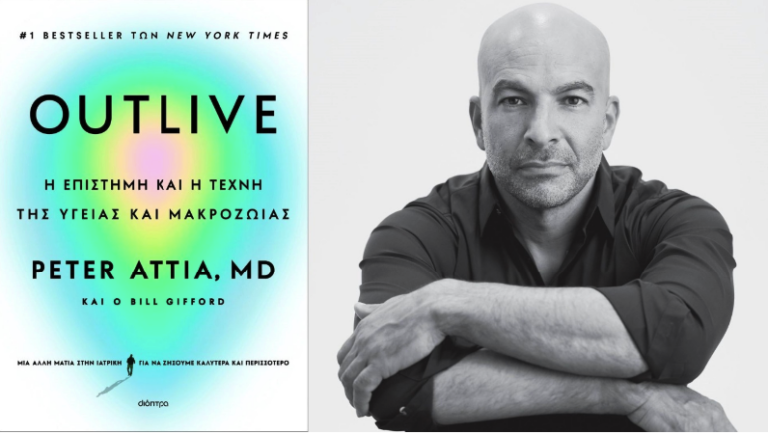Outlive, published by Diptra Publishing on March 6, 2024 by Dr. Peter Attia Bill Gifford, is a radical manifesto of longevity and well-being.
At 35, longevity expert Dr. Peter Attia was a long-distance swimmer who had crossed sea passages such as the Catalina Channel. But quite unexpectedly he would find that he was not healthy and that there was a high probability that he would die prematurely from heart disease.
This experience led him to seek the secrets of longevity: how and why we die and how we can delay or even prevent the chronic diseases that cause most deaths, such as heart disease, cancer, Alzheimer’s disease and type 2 diabetes.
In the book, Dr. Attia explains how his journey made him rethink his approach to medicine and care. Despite its successes, conventional medicine has not made much progress in fighting the diseases of aging.
Often therapeutic interventions are too late to have an effect, extending life span at the expense of health span, i.e. the patient’s quality of life. Dr Attia believes that we need to replace this outdated working framework with a personalised, pro-active longevity strategy where we act now, rather than waiting for conditions to occur.
This is not “biohacking”, but a strategic, scientific approach to extending lifespan that simultaneously improves physical, cognitive and emotional health. Dr. Attia’s goal is not to tell you what to do, but to help you learn how to think long-term health to create the best longevity plan for you.
Longevity and health are much more malleable than we think. It is now possible to chart a new life curve that will allow you to exceed your expectations and make each decade better than the last.
The need to believe that there is a “secret” to longevity
We all need to believe that there is some “secret” to longevity that will help us live longer, healthier and happier lives. And this desire lies behind our obsession with learning the habits and rituals of those who live so long.
People like Madame Kalman who seem to stubbornly resist death even though they smoked and did a whole host of other abuses in their lives fascinate and intrigue us. Was it the bicycle that helped her? Or was it the half a kilo of chocolate she said she consumed every week?
More generally, a key question is: What do healthy centenarians have in common?
And, more importantly, can we learn anything from them and, if so, what? Do they live longer despite or thanks to their idiosyncratic behaviours, e.g. whisky consumption? I wonder if there is a common factor that explains their extreme longevity or is it just luck?
Scientific research conducted on large populations of centenarians cast doubt (or even greater doubt) on the notion that such ‘healthy’ behaviours – I can only put the word in quotation marks of horror – are necessary to achieve extreme longevity.
According to results of a large study of Ashkenazi centenarian Jews conducted by Nir Barzilai at the Albert Einstein College of Medicine in the Bronx, centenarians do not take any more care of their health than the rest of us. In fact, they may take less care of it: many of the five hundred or so participants in the Einstein study consumed alcohol and smoked, sometimes for decades.
In fact, the male centenarians in the study were less likely to exercise regularly in their seventies than their peers in the control group. Also, many were overweight. So there goes the healthy lifestyle argument.
Are the centenarians just lucky? Undoubtedly, their age alone makes them extreme statistical outliers.
By 2021 there were just under 100,000 centenarians in the United States, according to the Census Bureau.
And although their numbers have increased by about 50 percent in just two decades, seniors over 100 represent only about 0.03 percent of the population, or about 1 in 3,333.
Surprisingly, although centenarian women outnumber centenarian men by at least four to one, generally centenarian men score higher on both mental and physical tests.
At first glance, this may seem odd, since on average women clearly live longer than men. Perls believes that we are dealing with a form of natural selection process, because men are more vulnerable to heart attack and stroke as early as middle age, while women show the same degree of vulnerability late after one or two decades and die less frequently from these conditions.
Thus, the most vulnerable members of the male population are wiped out, so that only those who had relatively increased robustness reach one hundred, while women usually live longer with the diseases of ageing and disability.
But for Perls this is a “double-edged sword”, since women do live longer, but their health is usually worse.
Earthquake – Kefalonia: Tselenti’s analysis of the very intense microseismic action
“Men are usually in better shape,” he said. (Although it’s something these scientists didn’t measure in their research, I have a feeling that this is because on average men have more muscle mass, a trait that, as we’ll see in the chapters on exercise, shows a strong correlation with longer life span and higher functioning.)
But even when not bursting with health in their eleventh decade of life, centenarians have already enjoyed many extra years of healthy life compared to the general population.
For a long time they have had an impressive length of health as well as life.
What’s even more impressive is that Perles’ team also found that super- and “semi-perennials” (ages 105 to 109) typically have even better health than “ordinary” centenarians.
These are the super-lifers and at such advanced ages lifespans and health are virtually identical. As Perles and his colleagues put it in their paper,
“The Longer You Live, the Healthier You Were”.
In mathematical terms, thanks to their genes, centenarians experience a phase shift in the time curve – that is, the entire curve of life span and health shifts to the right by one, two (or even three!) decades.
Not only do they live longer, but they are healthier and biologically younger than their peers throughout their lifetime. When they were sixty, they had the coronary arteries of a thirty-five-year-old.
At eighty-five, they probably felt and functioned like others in their sixties.
Outwardly they looked a generation younger than the age on their ID cards. This is the effect we wish to emulate.
The difference is that while most centenarians seem to attribute their longevity and well-being to genes or luck, the rest of us have to make a conscious effort to achieve the same result.
This brings us to the next two questions of interest: How do centenarians delay or avoid chronic disease? And how can we do the same?
They wrote for the book
“In Outlive, Peter Attia offers the most authoritative look at the complex issue of longevity.
Comprehensive and scientific, it contains excellent insights into the diseases of aging and the tactics and techniques to help us achieve longevity and wellness. Attia surprises the reader with his delightful style while inviting them to think about longevity from a new perspective.”
– Siddhartha Mukherjee, author of the Pulitzer Prize-winning The Emperor of All Maladies
“I entrust my life to Dr. Peter Attia. What sets him apart is that he seeks quality of life in all its aspects – physical, emotional, cognitive, relational and spiritual. This amazing book invites you to take action. It equips you with the tools you need to live longer, enjoy and find meaning in life.”
– Hugh Jackman
“Peter Attia examines the science of not only life extension, but also vitality, and points out the crucial connection between overall health and healthy relationships.”
– Esther Perel, author, psychotherapist and host of the podcast Where Should We Begin?
Ask me anything
Explore related questions





